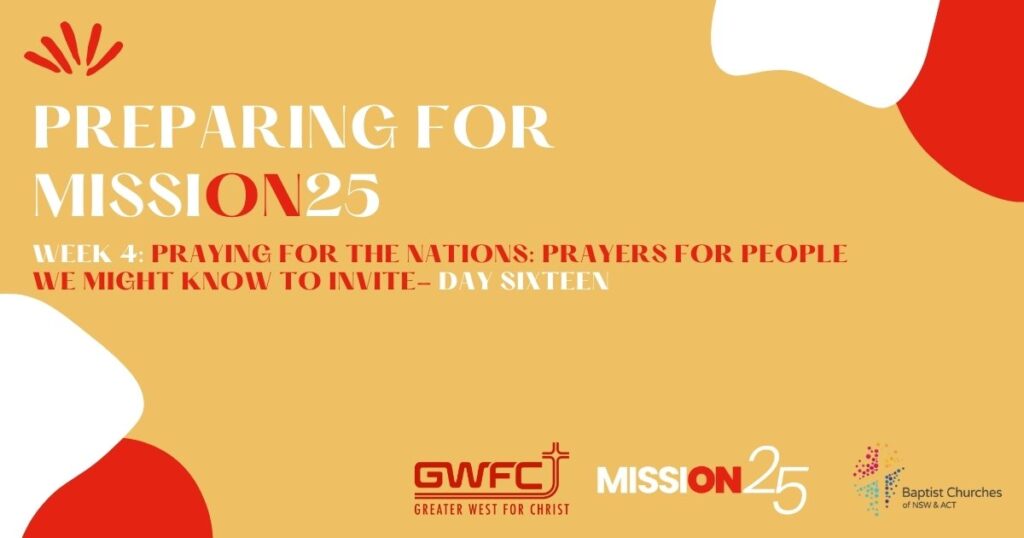Day 16 (Monday): Psalm 67
Today’s Passage
Read the passage – Psalm 67
The logic of Psalm 67 is that God blesses us so that his ways and saving power may be known to others. This prayer both starts and finishes the psalm.
Questions to Consider
- What does the psalmist pray for God’s people?
- What does the psalmist pray for us?
Prayer
- Lord, place specific people on our hearts to invite to the course.
- Pray for that “God may be gracious to us and bless us and make his face to shine upon us” so that we would be people who carry his good news to other and make known what God is like to others.
- Read the psalm and use it to pray for a country (or several!) accordingly. Pray also for the nations, the various ethnic groups, living in our community.
Go Deeper
David Platt, Matt Mason, and Jim Shaddix, Exalting Jesus in Psalms 51–100 (Nashville, TN: Holman Reference, 2020), 147–148.
In a sense Psalm 67 is simple. It contains one primary, overarching truth, a truth absolutely critical to understanding Christianity and the purpose of your life in this world. God blesses his people for the sake of his praise among all peoples. ….
There’s a pause at the end of verse 1 in the middle of a sentence. It says Selah, which is basically a musical term that signifies some kind of pause, as if to say, “OK, don’t move on too quickly in the song yet; just let it soak in.” Verse 1 is a petition based on a high-priestly blessing in Numbers 6:24–26. People would go to the priest, and the priest would bless them, saying, “May the Lord bless you and protect you; may the Lord make his face shine on you and be gracious to you; may the Lord look with favor on you and give you peace.”
The petition, “May God be gracious to you,” is like asking God to show you, a sinner who has rebelled against him, unmerited love and undeserved compassion. It is asking God not only to not give you what you deserve (condemnation) but also to give you what you don’t deserve (mercy). “May God bless you” is likewise a gracious petition for blessing. Even though in our sin we are all due the curse of God’s condemnation, this is an appeal for the blessing of God’s kindness and love. Asking for God to make “his face shine upon us” is like asking for the smile of the holy God of creation.
Is Psalm 67 talking about spiritual blessing or physical/material blessing? According to the text, the answer seems to be yes. Certainly, the psalm has to do with spiritual blessing—the gift of God’s grace, the light of God’s face—but then in verse 6 the reference to the “earth” clues us in that the psalmist has in mind God’s blessing on the land, most likely at harvest time. So, in addition to spiritual blessings, there’s a picture of physical and material blessings.
After verse 1 there’s a pause, not a period. We don’t simply ask for God’s blessing and then move on to something else. No, the thought is incomplete. Yes, we pause, but then we keep going. And the most important words in the psalm are the first words of verse 2: “So that.” Apparently, God has a purpose behind his blessing.
God blesses his people for the sake of his praise among all peoples. He blesses so that his saving power might be made known among all the nations (v. 2). The psalmist then erupts in verses 3–5, calling on the peoples to praise God and the nations to “rejoice and shout for joy.” The terms peoples and nations refer to tribes and clans and ethnic groups in the world. Scholars have identified more than eleven hundred different ethnic groups in the world today. These are groups of people who share a common language and cultural characteristics. In Hebrew the psalmist uses three different words for peoples and nations in this passage, underscoring that God aims to be praised by all (Goldingay, Psalms 42–89, 302–3). The psalmist wants people from the north to the south, from the east to the west, from the rich to the poor, from the young to the old, from the urban to the rural, in every tribe, in every language, and among every ethnic group on the earth to praise God. That’s the reason God blesses his people.
Songs for Worship and Reflection


